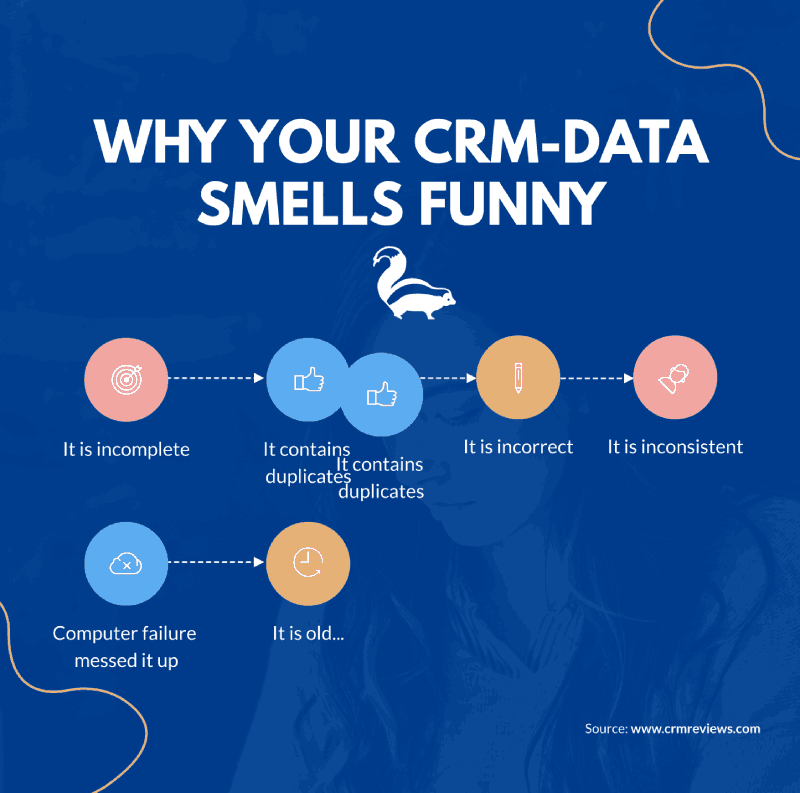If you’re a business owner, then you know how important it is to have a good customer relationship management (CRM) system in place. But what you may not know is that your CRM data can actually be a valuable asset for your business.
CRM data refers to the information found in your customer relationship management (CRM) system related to your business’ customers, leads, revenue, and operations. CRM data is an integral part of a business’s operations because it helps your business to make more informed decisions using information such as their customers’ interests and purchasing behaviors.
Every business uses data to create the best strategies and make vital forecasts regarding their operations, e.g., expected future sales. This means collecting relevant data is essential. CRM systems provide businesses with relevant data and reduce the chances of bad data affecting a business. According to research by IBM, bad data costs U.S. businesses approximately $3 trillion every year!

How bad CRM data piles up
When bad data finds its way into a CRM system, it will simultaneously diminish the system’s value and increase the cost of eliminating even the smallest data errors. For example, bad data will impede marketing efforts and reduce the deliverability rate of the marketing and sales teams. Also referred to as dirty data, bad data is usually erroneous due to factors such as:
- Human error: This is one of the most notorious causes for poor quality data. It is because many processes usually require the manual input of data, making it highly likely that errors will occur. The errors can even be “grave” if those entering data lack the technical knowledge to know what value or figures to input in what specific field. This means that there will be a lot of useless or irrelevant information. Such poor quality of information is then relayed to other departments of the organization and can cause massive losses due to poor decision-making.
- Incomplete data: This refers to data that has been left blank. The implication is that some vital functions in the marketing and sales department will not work as efficiently as they should.
- Duplicate data: Duplicating vital data such as customer records will incur high costs for the company or business. Think about a scenario where there has been an excess in the inventory. This can massively tamper with the activities of the procurement department and impede it from making the best procurement decisions.
- Incorrect data: This kind of data occurs when, during the inputting process, the creation of values outside of the perceived valid range happens. It could also be due to variations in the spelling, typos, and formatting problems—incorrect data results in the wrong interpretation of data.
- Inaccurate data: While data can be correct, it can also be inaccurate. This has massive, negative implications for your business. Take an example of a scenario where your customers fail to fill in some data when filling in online forms or inaccurate data. Whether this is intentional or purely an accidental mistake, this can affect a business’s decision-making and put it in a disadvantageous position to operate profitably.
- Inconsistent data: Inconsistent data results when similar data values are stored in different locations, thus causing redundancies and gross inconsistencies.
- Storage failure: Hardware failure can also be another major reason for data corruption or loss. Usually, data loss and corruption result in loss of revenue. For example, data loss can cause a business to fail to deliver services or products to customers as fast as it should.
- Old data: Some data usually expire after some time. For example, when a customer changes their contact information, the previous data about their contact details become outdated and irrelevant.
On the other hand, using high-quality data in your CRM system is a crucial step that will help you to provide positive user experiences and boost your revenue through more effective marketing campaigns. So, what is the importance of relevant CRM data?
The Importance of Relevant Data (Good Data Quality) For CRM
It can really be a struggle sometimes to call attention to data quality. In the day-to-day business, it is often not a top priority. Yet incomplete or incorrect data can have a big impact on the business. Do you need to convince stakeholders of the importance of good CRM data? Maybe these arguments will help you:
1. More Informed decision-making
Good CRM data quality contributes to better decision-making throughout an organization. There is increased confidence and consistency in the overall decision-making and reduced risk for negative decisions.
2. Improved audience targeting
Data quality also will guarantee that you do not tailor your marketing efforts to a wide audience. This means that your marketing resources will be directed to the most suitable niche. It is because high-quality data will give you accurate insight into your target audience, thus coming up with products and services tailored just for them.
3. More Effective content and marketing campaigns
Good data quality can help you improve your content and marketing campaigns. It helps you establish the most preferred products and services, thus enabling you to develop the most appropriate marketing strategies. This is relevant to the entire customer journey. From new business lead generation to lead nurturing and up-sell actions with existing customers. Good data is key for an Account Based Marketing campaign for example.
4. A business can improve its relationship with customers
High-quality data can improve a business’s relationship with its customers as it gives you a comprehensive insight into its customers’ preferences, interests, and needs. The business responds by providing them with content that appeals to them.
5. High-quality data is easy to use
High-quality data is easier to use than poor-quality data as it also improves a business’s operational efficiency. It is because high-quality data is complete as opposed to bad quality data that needs to be fixed and thus takes a lot of time away from a business’s core activities.
6. It allows a business to gain a competitive advantage
Higher-quality data allows you to use your data more effectively and in a more impactful way. It will help a business to discover opportunities long before the competitors do. A business can anticipate prospects’ needs better and thus, beat their main rivals to sales.
7. Increased Profitability
High-quality data helps a business achieve increased profitability, and it reduces the chances for ad waste as it helps a business create more cost-effective marketing campaigns.

Types of CRM data your business should collect and maintain in its CRM system
Identity Data
Identity data refers to the information that can be used to locate users’ details or identify clients. Identity data is the first type of information usually added to a CRM system after an interaction with a new client or seller.
Some examples of CRM identity data includes:
- The name of a person or organization
- Physical address
- Mailing address
- Email address
- Home, work, and mobile phone numbers
- Date of birth
Identity data usually comes in handy when organizing a business’s records and communicating with customers and leads. The best CRMs software to use with identity data includes:
- Pipedrive
- Salesforce
- Agile CRM
These platforms allow the identity data to be viewed as an individual record or as a list.
Descriptive Data
Descriptive CRM data refers to data that provides more personal insight into a user or business. The major difference between identity and descriptive data is that any form of identity data usually identifies just a specific record, whereas descriptive data usually identifies multiple records. For example, a phone number usually identifies a specific contact record, while descriptive data, e.g., job title, industry, ZIP code, etc., can identify multiple records.
Descriptive CRM data is generally more customizable to a business’s needs. For example, Zoho CRM’s tagging feature usually lets users tag records with specific information such as the descriptive data for the location where a lead originated from.
Some examples of descriptive include:
- Career and education details such as the company name, profession, and education level.
- Family details such as a contact’s marital or parental status.
- Lifestyle information such as homeownership status or car ownership status.
Qualitative data
Qualitative data refers to data that is measured by factors such as the behaviors or feelings of a customer or lead. Qualitative data is usually more subjective. Some examples of qualitative CRM data include:
- Customer satisfaction with a particular product or service
- Better platform customization
- The higher likelihood for repeat purchases
Qualitative data can usually be stored in your CRM and is very effective at informing you about your customers’ attitudes, motivations, and purchasing behaviors. Such type of information can be collected from direct customer feedback and surveys.
Quantitative Data
Quantitative data effectively illustrates how a client or lead usually interacts with a business. Quantitative CRM data is measurable and objective. Examples of Quantitative CRM data include both information that can be viewed individually, e.g., the number of times a specific client has opened a promotional email, and information that can be viewed collectively, e.g., the total revenue of all the existing clients.
Other common examples of quantitative data include:
- The total website traffic per day
- The email campaign reply rate
- The total service tickets filed
Quantitative CRM data can be viewed in a record-by-record manner when a business needs to acquire specific, measurable data regarding a particular client. For example, the HubSpot CRM platform provides quantitative data on an individual user profile that includes:
- The total potential revenue of a transaction
- The number of service tickets that specific clients have filed
- The number of purchases a client has made from you as well as the average order value
- How often your clients have visited your website
- How often do your clients interact with your company on social media platforms

Ideal CRM Data Structure
After a business establishes the types of data it needs to have in its CRM, it must devise ways of keeping it organized through effective IT management. The method you choose for organizing your data will determine the quality of your reporting and how your team operates. Usually, the ideal CRM data structure will depend on the needs of a business and the CRM KPIs. Some of the common CRM data structures include:
Lifecycle Data
Lifecycle data refers to a type of data structure that depends on sales readiness to categorize the leads. A business determines where its leads are in its sales funnel. For example, a user who has just signed up for an email newsletter is a prospect. On the other hand, an “evangelist” refers to a long-term client who has given you many referrals. Every stage of a business’s sales life cycle needs different forms of marketing. The evangelist would need to be given incentives from time to time for giving the business new business through referrals. However, the prospect will not find Call-to-Actions like “buy now” in their emails very soon. Map your DMU for a complete picture.

Lead Status
CRM data is also effective at helping you track your leads’ status. The lead status structure provides a business with a more granular view of their clients and the sales interactions it has with them. A business can mark the leads as either new, in progress, open, open deal, unqualified, bad timing, connected, etc. A business can also record the dates and times that it tried to reach its leads or altered their lead status. This allows the sales team members to easily pick up from where another sales team member left off.
Custom Objects
Usually, the standard contact data options can easily fit the needs of many sales teams. However, there are other situations where these sales teams will need to log additional data into their CRM systems. This is where custom objects come into play! They are a valuable way of storing all the relevant information in a business organization’s CRM. Using custom objects allows enables the sales team to log in easily and categorize this relevant data. This provides high flexibility during logging, accessing, and leveraging valuable information.
Conclusion
To maximize the full potential of its CRM system, a business needs to have a clear idea regarding the different types of data it can store and have a deep understanding of the different data structures. These different data structures will help businesses monitor their interactions with their leads or clients. In addition, both the type and structure of CRM data will allow these businesses to send personalized communication to potential and existing clients more effectively. Consequently, this will help businesses build and strengthen customer loyalty by improving the quality of their products and services.
Start using your CRM Data today!
Looking for CRM? Use our CRM Comparison Tool to choose the best CRM for your business.
Photo by Emmet via Pexels
Check out our top 3 CRM solutions for this month
Recommended Reading
Buying Behavior: The Definition
Buying behavior refers to what consumers or organizational buyers do when considering or making a purchase.
Quotation tips that will increase your scoring rate in 2025!
With these quotation tips, you will increase your scoring chances straight into 2025! Turn your quotation into a sales tool. Read more...
What is a DMU?
What is a DMU? DMU stands for Decision Making Unit and is often mentioned as a factor to consider in b2b purchasing processes.
What is a good sales pitch? Tips & examples!
Are you up to date with your sales pitch? Check out our tips and insights for the best sales pitch for success!
Email Marketing: the ultimate guide with tips & tools
Email marketing: indispensable for every organisation. Read everything about e-mail marketing here. ✅ Including tips!
Compare CRM systems
We help you compare customer relationship management software (CRM) based on several essential functions and features. Try it now
